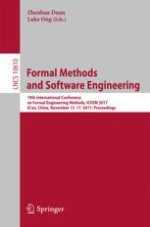2017 | OriginalPaper | Chapter
Learning Types for Binaries
Authors : Zhiwu Xu, Cheng Wen, Shengchao Qin
Published in: Formal Methods and Software Engineering
Publisher: Springer International Publishing
Activate our intelligent search to find suitable subject content or patents.
Select sections of text to find matching patents with Artificial Intelligence. powered by
Select sections of text to find additional relevant content using AI-assisted search. powered by
